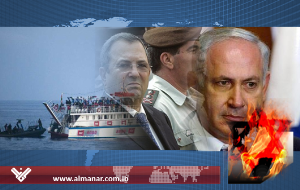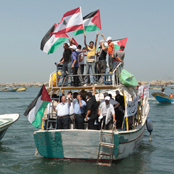Hezbollah’s Flotilla?
 Is Hezbollah outfitting blockade-busters to send to Gaza? It appears not, despite some breathless innuendo put forth by an Israeli think tank with close ties to Israel’s intelligence community.
Is Hezbollah outfitting blockade-busters to send to Gaza? It appears not, despite some breathless innuendo put forth by an Israeli think tank with close ties to Israel’s intelligence community.
The Intelligence and Terrorism Information Center in Israel put out a report on June 22 entitled “The aid flotilla planned to set sail from Lebanon is supported by Syria and Hezbollah.” The detailed analysis compiles lots of details about the organizers of two Lebanese boats that plan to sail to Gaza in defiance of Israel’s blockade. One of the organizers, Yasser Qashlak, appears in a clip on Hezbollah’s Al-Manar television network spewing racism:
A day will come when the ships will carry the remainder of the European garbage which came to my homeland [i.e., Israel] and return them to their homelands.
When it comes to the money point so boldly proclaimed in the headline, the Intelligence and Terrorism Information Center quite reasonably concedes (albeit far down, in paragraphs 15 and 16 of a 17-paragraph report) that it found no evidence to substantiate the claim that Hezbollah and Syria are behind the Nagi al-Ali and the all-woman-crewed Maryam.
Hezbollah is careful not to publicly affiliate itself with the Lebanese flotilla, out of fear of complications with Israel. Another reason is the understanding that it will harm their ability to represent the flotilla as reflecting a human rights effort. In response to many articles in the media, Hezbollah issued an explicit denial of its involvement. … The organizers of the ships repeatedly state in interviews with the media that they have no connections with Hezbollah.
That didn’t stop the Israel Defense Forces from trumpeting the report on its news page with the headline “Report: Hezbollah and Syria are organizing the Lebanese flotilla.”
Meanwhile the Lebanese flotilla organizers are finishing the process of getting clearance from the Lebanese government, which wants to stay as far away as it can from provoking Israel. The ships won’t fly the Lebanese flag, and they will sail first to Cyprus and only then to Gaza.
Lebanon and Israel officially remain in a state of war after signing a ceasefire in 1948. While Hezbollah – which is doctrinally committed to the destruction of Israel – dominates Lebanese politics, the government officially is under the leadership of Western-allied Prime Minister Saad Hariri, although one-third of its cabinet members come from Hezbollah and its coalition partners.
 Hezbollah (like Hamas) has riled up its base about the Gaza blockade and the deaths of nine people aboard the Turkish ship that tried to bust it. The deadly episode on May 31 fit neatly into Hezbollah’s narratives about Islamic Resistance about “the Zionist entity.” Not least, Hezbollah cashed in rhetorically on the fact that religious Islamists fought Israeli commandos, thereby provoking a policy revision a few weeks later – the first relaxing of the blockade, and in the worldview of Hezbollah and Hamas, an achievement for Islamists on an issue on which secular Palestinians had failed to force any change.
Hezbollah (like Hamas) has riled up its base about the Gaza blockade and the deaths of nine people aboard the Turkish ship that tried to bust it. The deadly episode on May 31 fit neatly into Hezbollah’s narratives about Islamic Resistance about “the Zionist entity.” Not least, Hezbollah cashed in rhetorically on the fact that religious Islamists fought Israeli commandos, thereby provoking a policy revision a few weeks later – the first relaxing of the blockade, and in the worldview of Hezbollah and Hamas, an achievement for Islamists on an issue on which secular Palestinians had failed to force any change.
“Israel Preparing for Flotillas Like on Eve of War” screamed a June 23 headline on Al-Manar. (Hezbollah also threatened this week to sue the United States for libel, claiming that Washington and its Arab allies had spent $500 million “to bribe people to criticize Hezbollah.”)
Challenging the Gaza blockade is a popular unifying cause in Lebanon, appealing to nearly every constituency, even those who oppose Hezbollah. Defending Palestinian rights in Gaza also provides a welcome distraction for Lebanese politicians currently struggling with the matter of the second-class status of Palestinian refugees in Lebanon.
For Sayyed Hassan Nasrallah, Hezbollah’s supreme leader and a gifted orator, the affairs of the boats and the siege have created a ripe opportunity to make rhetorical hay, and – once again – to position Hezbollah as the beneficiary of an effort to which it contributed nothing tangible. (Not unlike Hamas, the main, and perhaps unintended, beneficiary of the last flotilla.)
From Nasrallah’s most recent speech (translation by Al-Manar):
This is a lesson for some of those who preach the policy of humiliation, delusion and wishful thinking that only result in disgrace. On the other hand a policy based on power can accomplish a lot. …
There is a good chance today to end the blockade imposed on Gaza and this requires more Freedom flotillas. … We have to benefit from the Freedom flotilla to remind the world of Israel’s massacres
Israel’s New Crisis at Sea
Writing at The Daily Beast, I look at what the future holds for Israel’s Gaza policy now that the Netanyahu government has decided to relax its blockade. I suspect even more challenges to the current legal arrangement which puts both Israel and Gaza in limbo. Read the whole piece here.
If the Netanyahu government translates Sunday’s statement into a substantially more open border with Gaza, they’ll find the calls for a new approach to Gaza just as shrill as ever—perhaps even more shrill now that Israel has backed down on one element of the blockade. What Gazans object to is that Israel claims to have ended any vestiges of occupation of Gaza when it pulled out the Jewish settlements in 2005—and yet, at the same time Israel retains control of Gaza’s sea and land borders.
That’s the nub of the problem, and not the shortage of foodstuffs and medicines. If Israel resolved Gaza’s humanitarian concerns, the Palestinians in Gaza would still be incensed that they can’t travel, import or export goods without Israel’s permission.
In other words, it’s not the cilantro; it’s the siege that’s the problem


